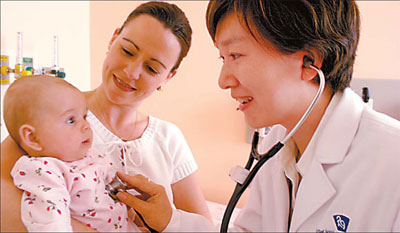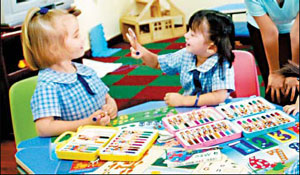Good medical care and facilities are concerns of expat parents. Courtesy of Beijing United Family Hospital
From a baby's point of view, being raised in China is much the same as anywhere else - the problem can be mom and dad. They may struggle with the language, cultural differences and the absence of friends and family as a support network.
On the flip side, there are bonuses to being an expat parent and these include being able to afford an ayi to help out with life's necessities, bringing up a bilingual child and letting it experience another culture at a young age.
"Children here get more parent time than in their home country. When parents relocate, they often end up devoting more time and energy to the kids because the wife, or guy, can afford to stay at home," says the managing director of China Expert International Ltd, Colin Friedman.
"Maybe, they find there's more to life than work," says the parent of three, who has been living in Beijing for a decade and is an unpaid moderator on the website Beijing Community (www.beijingcommunity.com), which gives advice to people who are moving to China.
"There's a lot of misinformation, or lack of information. They tend to think people here are wearing straw hats, riding bikes and having four bowls of rice. China has moved on," Friedman says.
Today, China's mega cities are much the same as other international conurbations in terms of medical care, facilities, kindergarten provision and support networks. And they are just as safe.
Fifty years ago in China, two out of every 10 babies died in their first year. Now, the infant mortality rate is 23 per thousand for China as a whole, according to UN statistics. In Beijing it was 4.6 in 2005, better than the United States.
For BBC correspondent Micky Bristow and his partner, who have children aged 1 and 3, China can be more child-friendly than home. Here, he says, kids are central to everyday life, appreciated more and "not just plonked in front of the TV".
"There's no problem with going to restaurants, they just bring out a high chair. I can't imagine people being so accommodating back in England where the attitude is a bit different and it can be difficult to take your children out some places."
The downside of bringing up babies away from home, Bristow says, is the absence of family and friends to provide support and take up babysitting duties. His other gripes are pram access to buildings and the unevenness of pavements (though he acknowledges this is changing fast) and more importantly, pollution.
"Cultural differences do have to be overcome. Western people generally want their children to be more independent. If they fall over we encourage them to get up on their own and sort out their own problems. Our ayi sees things differently sometimes, but at the end of the day we employ her, so she does what we want."
Yang Yanxia is from Shenyang in Liaoning province, but lives with her British husband and 3-year-old son in Beijing. She agrees there are cultural misunderstandings that need to be discussed and resolved. One of their sticking points, she says, is the attitude of her parents.
"Most Chinese families have grandparents to take care of the children. They love the baby too much and don't let it experience life for themselves, so they can be a bit spoiled and passive. We want an active and independent boy."
The part-time insurance sales agent says this attitude could be exacerbated by the one-child policy, which partially explains the doting attitude of Chinese toward their "little emperors and empresses", who can be intolerant and unsociable as a result.
"One of the biggest challenges of living in a different country is there are different ways of doing things," says Bradley method childbirth teacher Kathi Levitan, from New York. "But, it's not particle physics and there's not just one answer even in one's own country."
The nurse/midwife, who has two daughters and has lived "on-and-off" in Beijing since 2000, says her clients are from all four corners of the world and have different values and expectations, but concludes giving birth and raising a child should be a positive experience wherever it is.
On a practical note she says air quality is a genuine concern and advises parents to have air purifiers in the home and not to go outside on the worst days. She counsels parents to use car seats even in taxis, if possible, as there are more traffic accidents. She also advises parents to ensure their ayi has a health check before starting work.
Both the BBC's Bristow and insurance agent Yang reckon pre-school provision is patchy and can be expensive. Public run kindergartens in some areas are massively oversubscribed and private nurseries are charging around 3,000 yuan ($413) a month.
Cultural differences are academic for Christopher Panza, who is an assistant professor of philosophy at Drury University, Springfield, Illinois, in the United States. In an exchange of e-mails he says even though Confucius' sayings in The Analects do not specifically mention 0-2 year olds, Confucian thought still has an impact on child-rearing attitudes in China today.
"What's important is that the parents do their best to not only care for the child, but also to develop very close relational ties. From this early age practices should be set up to best result in the child developing a very close interdependent bond with the parents", and thereby society as a whole.
Panza, who will be teaching at Tsinghua University next spring and has a 3-year-old and another on the way, recently hosted a Chinese couple and discovered there were glaring cultural differences. For instance, in Chinese society, a parent spends more time feeding their child.
"The focus here is not on teaching the child to autonomously feed, but rather to develop an eating ritual that cultivates close ties between the mother (or father) and child."
In a Confucian society, he says, it is more likely that parents will sleep with their children until they are older; and the US concept of "alone time" is unlikely to be favored here either.
Further, he says, in his country it is rare for one parent to criticize another, certainly openly, but because of the communal nature of selfhood in China there are no firm boundaries separating one family from another.
"In a sense, your child is everyone's child."
Youngsters growing up in China are exposed to many different cultures.
(China Daily January 14, 2008)



